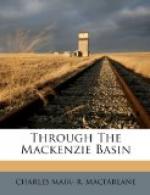Farther up, the right bank rose bare to the sky-line with a mere sprinkling of small aspens, indicating what the appearance of the “rampike” country would be if again set ablaze, and converted from a burnt-wood region to a bare one. The banks revealed a clay soil, in some places mixed boulders, but evidently there was good land lying back from the river.
In the morning bets were made as to the hour of arrival at the Landing. Mr. P. said four p.m., the writer five, the Major six, and Mr. C. eight. At three p.m. we rounded the last point but one, and reached the wharf at six-thirty, the Major taking the pool.
We had now nothing before us but the journey to Edmonton. At night a couple of dances took place in adjacent boarding-houses, which banished sleep until a great uproar arose, ending in the partisans of one house cleaning out the occupants of the other, thus reducing things to silence. We knew then that we had returned to earth. We had dropped, as it were, from another planet, and would soon, too soon, be treading the flinty city streets, and, divorced from Nature, become once more the bond-slaves of civilization.
Conclusion.
I have thought it most convenient to the reader to unite with the text, as it passes in description from place to place, what knowledge of the agricultural and other resources of the country was obtainable at the time. The reader is probably weary of description by this time; but, should he make a similar journey, I am convinced he would not weary of the reality. Travellers, however, differ strangely in perception. Some are observers, with imagination to brighten and judgment to weigh, and, if need be, correct, first impressions; whilst others, with vacant eye, or out of harmony with novel and perhaps irksome surroundings, see, or profess to see, nothing. The readiness, for instance, of the Eastern “fling” at Western Canada thirty years ago is still remembered, and it is easy to transfer it to the North.
Those who lament the meagreness of our records of the fur-trade and primitive social life in Ontario, for example, before the advent of the U. E. Loyalists, can find their almost exact counterpart in Athabasca to-day. For what that Province was then, viz., a wilderness, Athabasca is now; and it is safe to predict that what Ontario is to-day Athabasca will become in time. Indeed, Northern Canada is the analogue of Eastern Canada in more likenesses than one.
That the country is great and possessed of almost unique resources is beyond doubt; but that it has serious drawbacks, particularly in its lack of railway connection with the outer world, is also true. And one thing must be borne in mind, namely, that, when the limited areas of prairie within its borders are taken up, the settler must face the forest with the axe.
Perhaps he will be none the worse for this. It bred in the pioneers of our old provinces some of the highest qualities: courage, iron endurance, self-denial, homely and upright life, and, above all, for it includes all, true and ennobling patriotism. The survival of such qualities has been manifest in multitudes of their sons, who, remembering the record, have borne themselves manfully wherever they have gone.




